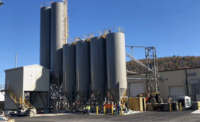Construction Materials
States Vie for $1.2B From FHWA to Boost Use of Low-Carbon Materials

Funding comes from the Inflation Reduction Act, also called the Climate Act.
Graphic by ENR Art Dept.
UPDATED: The U.S. Dept. of Transportation's Federal Highway Administration has launched a competition among the states for shares of $1.2 billion in funds to promote the use of low-carbon materials on highway projects.
In a March 12 announcement that the agency has begun to accept applications for the funds, Transportation Secretary Pete Buttigieg noted that transportation and industrial sectors account for about half of U.S. greenhouse gas emissions. The program aims to “accelerate the use of cleaner construction materials that create less carbon pollution,” he said
Federal Highway Administrator Shailen Bhatt said, “The use of lower carbon materials, which match the durability of conventional materials while lowering pollution, is one pathway that will help us achieve President Biden’s goal of net zero emissions by 2050.
Eligible materials categories are concrete (and cement), glass, asphalt mix and steel.
State applications are due by June 10. FHWA said each successful state applicant will receive at least $22 million.
Construction Groups Gear Up
Industry organizations interest in the program is keen. The launch "is the moment we've been waiting for," said Thomas J. Van Dam, a principal at Wiss, Janney Elstner. He also is a leader of the Reduced Carbon Concrete Consortium, an industry effort formed by the American Concrete Pavement Association. National Concrete Pavement Technology Center and other groups. It aims to provide information about reducing carbon in construction and helping state DOTs and other entities with applications for the FHWA program funds.
"I believe numerous states will be interested in this funding," saidJ. Richard Willis, National Asphalt Pavement Association vice president of engineering, research and technology, in comments emailed to ENR, "Acting upon that interest will depend on how diffcult the application and implementation processes are."
AASHTO Weighs In
The American Association of State Highway and Transportation said in a March 15 statement to ENR, "State DOTs are in the process of identifying what products can be utilized to meet the guidelines of low carbon emissions while making sure their infrastructure is not negatively impacted."
AASHTO added that "state DOTs support the program's using incentives, saying that approach "is highly preferable to mandating the use of specific projects."
AASHTO also said taking steps to regionalize thresholds would "go a long way to maintain the necessary contractor competition for low-bid construction contracting used by state and local agencies–especially for more-rural states or states with isolated, rural areas."
Funds come from the 2022 Inflation Reduction Act–also called the Climate Act, because of its estimated $369 billion in climate-related federal aid.
The $1.2 billion for state grants is the first phase of a $2-billion program.
Funds in the second phase, totaling $800 million, will go to non-state applicants, such as cities, tribes, metropolitan planning organizations and other agencies. FHWA said nonstate applicants will be encouraged to team with states. That program will begin taking applications later this year, the agency said.
Funding will be distributed in the form of incentive payments or reimbursements according to FHWA.
It said the program seeks to recognize construction materials and products that have "substantially lower levels of embodied GHG emissions associated with all relevant stages of production, use and disposal,” compared with estimated industry averages.
The pavement association has set up a task force and is working with FHWA and the U.S. Environmental Protection Agency on a data-collection framework that state agencies could use to meet program requirements, Willis said.
The FHWA announcement also drew praise from environmental advocates. Yong Kwon. a Sierra Club senior policy analyst, said in a statement that it "sends an important signal to manufacturers of steel, cement and other construction materials that the market will reward their efforts to reduce greenhouse gas emissions."
Story updated with comments sent 3/15 from AASHTO








